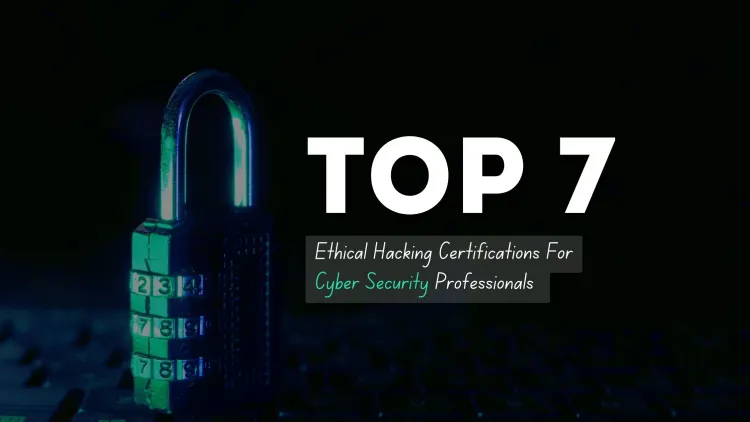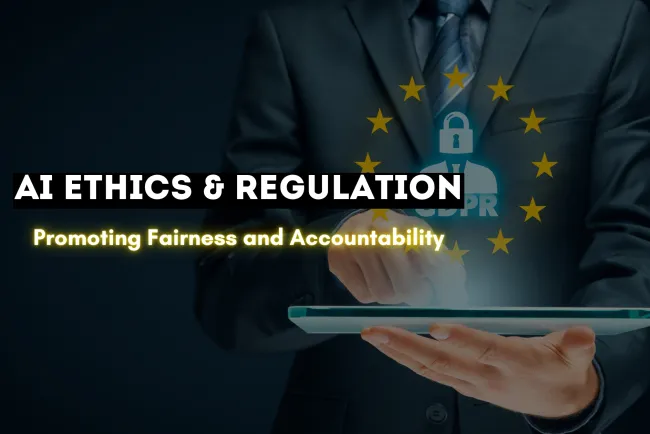Top 7 Ethical Hacking Certifications for Cybersecurity Professionals
Ethical hacking is a crucial field in cybersecurity that involves identifying and addressing vulnerabilities in systems to prevent cyberattacks. To succeed in this domain, obtaining the right certifications is essential. Some of the best certifications for ethical hackers include the Certified Ethical Hacker (CEH), Offensive Security Certified Professional (OSCP), CompTIA Security+, Certified Penetration Testing Engineer (CPTE), GIAC Penetration Tester (GPEN), Certified Information Systems Security Professional (CISSP), and Certified Information Security Manager (CISM). These certifications provide individuals with the necessary skills and knowledge to excel in ethical hacking and cybersecurity roles, paving the way for a successful career in protecting organizations from cyber threats. Whether you're starting your journey or advancing in the field, pursuing the right certifications is key to standing out in the competitive cybersecurity job market.

In today's increasingly digital world, cybersecurity is more crucial than ever. With cyberattacks becoming more sophisticated, businesses and organizations are actively seeking professionals who can safeguard their networks, systems, and data from malicious threats. One of the most vital roles in this battle is that of an ethical hacker, also known as a penetration tester. Ethical hackers are skilled professionals who use the same techniques as cybercriminals to identify vulnerabilities in systems, but instead of exploiting them, they help organizations fix these weaknesses.
To kickstart a career in ethical hacking, obtaining the right certifications can set you apart in this highly competitive field. In this blog, we’ll explore the 7 best ethical hacking certifications that will help you build a solid foundation in cybersecurity and pave the way for a successful career.
1. Certified Ethical Hacker (CEH)
The Certified Ethical Hacker (CEH) certification, offered by EC-Council, is one of the most recognized and widely respected certifications in the ethical hacking community. This certification is designed to provide professionals with the skills and knowledge required to understand and identify vulnerabilities in a wide range of systems and networks.
What You’ll Learn:
- The fundamentals of ethical hacking
- Various hacking techniques, including scanning, enumeration, and penetration testing
- Methods to safeguard systems, applications, and networks from cyberattacks
Why It Matters:
CEH is often the first certification that individuals pursue when entering the ethical hacking field. The certification demonstrates a comprehensive understanding of hacking tools and techniques, and it is recognized globally. Many organizations seek CEH-certified professionals to conduct regular security audits and vulnerability assessments.
2. Offensive Security Certified Professional (OSCP)
The Offensive Security Certified Professional (OSCP) certification is known for its rigorous and hands-on approach to ethical hacking. Offered by Offensive Security, OSCP focuses on penetration testing skills and emphasizes real-world scenarios that test candidates' problem-solving abilities. Unlike many other certifications that rely on theoretical knowledge, OSCP requires candidates to prove their skills in a live, controlled environment.
What You’ll Learn:
- Practical penetration testing skills
- Advanced techniques for exploiting vulnerabilities
- How to conduct thorough security assessments
Why It Matters:
OSCP is considered one of the most challenging ethical hacking certifications, making it highly regarded in the cybersecurity industry. It’s a must-have for those who want to demonstrate their practical skills and proficiency in real-world penetration testing.
3. CompTIA Security+
While not solely focused on ethical hacking, CompTIA Security+ is an excellent entry-level certification for those beginning their cybersecurity journey. The certification covers a broad range of topics in cybersecurity, including network security, cryptography, and risk management, all of which are foundational for a career in ethical hacking.
What You’ll Learn:
- Basic network security and cryptography concepts
- Risk management and threat mitigation techniques
- Identity and access management
Why It Matters:
CompTIA Security+ is a great starting point for anyone interested in cybersecurity. It builds a strong understanding of security concepts, and it’s often a prerequisite for more specialized certifications like CEH and OSCP. Security+ is a well-respected certification that gives you the groundwork for a successful career in ethical hacking.
4. Certified Penetration Testing Engineer (CPTE)
The Certified Penetration Testing Engineer (CPTE) certification, offered by the EC-Council’s partner organizations, is designed to help professionals master the skills required to conduct thorough penetration tests. This certification emphasizes hands-on practical experience and prepares individuals to handle the complexities of modern-day cybersecurity threats.
What You’ll Learn:
- Penetration testing methodologies and techniques
- Ethical hacking tools and technologies
- How to identify vulnerabilities in applications and networks
Why It Matters:
CPTE is an excellent certification for those who want to focus on penetration testing and exploit vulnerabilities in various systems. It is highly recommended for aspiring ethical hackers who want a comprehensive understanding of security testing procedures.
5. GIAC Penetration Tester (GPEN)
The GIAC Penetration Tester (GPEN) certification is offered by the Global Information Assurance Certification (GIAC) and is designed for professionals looking to demonstrate their skills in penetration testing. GPEN focuses on testing systems and networks to uncover vulnerabilities that attackers could exploit.
What You’ll Learn:
- Penetration testing techniques
- Exploiting network vulnerabilities
- Proper documentation and reporting of findings
Why It Matters:
GPEN is ideal for individuals who want to specialize in penetration testing and demonstrate their expertise in security assessments. It’s recognized by employers as a valuable credential for those interested in vulnerability analysis and penetration testing.
6. Certified Information Systems Security Professional (CISSP)
The Certified Information Systems Security Professional (CISSP) certification, offered by ISC2, is aimed at experienced cybersecurity professionals who want to advance their careers. While CISSP focuses more on information security management rather than ethical hacking, it provides critical knowledge for ethical hackers working in larger organizations or those leading security initiatives.
What You’ll Learn:
- Security and risk management principles
- Security architecture and engineering
- Incident response and disaster recovery
Why It Matters:
CISSP is an advanced certification that is perfect for experienced professionals who want to progress into leadership or managerial roles. Ethical hackers who hold a CISSP certification are equipped to manage large-scale security programs and lead cybersecurity initiatives within organizations.
7. Certified Information Security Manager (CISM)
The Certified Information Security Manager (CISM) certification, offered by ISACA, is designed for individuals who manage, design, and assess an organization's information security program. While not focused purely on ethical hacking, CISM’s knowledge of security governance and risk management is crucial for any ethical hacker aiming to understand the broader context of cybersecurity within organizations.
What You’ll Learn:
- Information security governance
- Risk management and incident response
- Designing and managing security policies
Why It Matters:
CISM is a great choice for those who want to combine ethical hacking with a strategic understanding of information security. It’s a valuable credential for professionals who aspire to take on managerial roles in cybersecurity while maintaining a strong technical foundation in ethical hacking.
Conclusion
The world of ethical hacking offers exciting opportunities for individuals passionate about cybersecurity. With the right certifications, you can unlock doors to high-paying, impactful careers that help protect organizations from the growing threat of cyberattacks. Whether you’re starting with foundational certifications like CompTIA Security+ or pursuing more advanced credentials such as OSCP and CISSP, each certification offers unique benefits that will enhance your skills and career prospects.
By pursuing these top ethical hacking certifications, you’ll not only gain the technical expertise necessary to succeed in the cybersecurity industry but also demonstrate your commitment to keeping systems and data secure. So, kickstart your cybersecurity journey today by choosing the certification path that aligns with your goals, and start making an impact in the fight against cybercrime.
FAQ:
What is Ethical Hacking?
Ethical hacking involves using the same techniques as cybercriminals to test and identify vulnerabilities in systems, networks, and applications, but with the permission of the organization. The goal is to improve security and protect against malicious attacks.
2. Why Should I Pursue an Ethical Hacking Certification?
An ethical hacking certification demonstrates your expertise in cybersecurity and ethical hacking techniques, helping you stand out in the job market. It also provides practical skills to identify and mitigate security risks, making you an asset to organizations.
3. What Are the Best Certifications for Ethical Hackers?
Some of the best certifications include:
- Certified Ethical Hacker (CEH)
- Offensive Security Certified Professional (OSCP)
- CompTIA Security+
- Certified Penetration Testing Engineer (CPTE)
- GIAC Penetration Tester (GPEN)
- Certified Information Systems Security Professional (CISSP)
- Certified Information Security Manager (CISM)
4. What is the CEH Certification, and Why Is It Important?
The Certified Ethical Hacker (CEH) is one of the most recognized certifications in the ethical hacking community. It covers a wide range of topics like penetration testing, network security, and vulnerability assessment, providing foundational skills for an ethical hacking career.
5. What Skills Will I Learn With the OSCP Certification?
The Offensive Security Certified Professional (OSCP) certification teaches practical penetration testing skills. You will learn how to exploit vulnerabilities, perform security assessments, and solve real-world hacking challenges in a controlled environment.
6. Is CompTIA Security+ Enough for a Career in Ethical Hacking?
CompTIA Security+ is an excellent entry-level certification that covers general cybersecurity topics such as network security, risk management, and cryptography. While it doesn’t focus solely on ethical hacking, it provides a solid foundation for more advanced certifications like CEH and OSCP.
7. What is the Difference Between CEH and OSCP?
CEH is more theoretical, providing a broad overview of ethical hacking tools and techniques, while OSCP is hands-on and focuses on practical penetration testing skills in a real-world environment. OSCP is more challenging and highly respected in the industry.
8. Do I Need a Degree to Become an Ethical Hacker?
While a degree in computer science or cybersecurity can be beneficial, it is not required. Ethical hacking certifications can provide you with the practical skills and knowledge needed to start a career in cybersecurity, making certifications like CEH, OSCP, and CompTIA Security+ valuable.
9. What Are the Career Opportunities for Certified Ethical Hackers?
Certified ethical hackers can pursue careers as penetration testers, security analysts, cybersecurity consultants, and IT auditors. Ethical hackers are in high demand, especially in industries like finance, government, healthcare, and tech.
10. How Do I Choose the Right Ethical Hacking Certification for My Career?
Consider your career goals and current skill level. If you're just starting, certifications like CompTIA Security+ or CEH are ideal. For those with more experience, OSCP, CISSP, or GIAC Penetration Tester are excellent choices. Choose a certification that aligns with your interests and the specific skills you want to develop.












![Top 10 Ethical Hackers in the World [2025]](https://www.webasha.com/blog/uploads/images/202408/image_100x75_66c2f983c207b.webp)

![[2025] Top 100+ VAPT Interview Questions and Answers](https://www.webasha.com/blog/uploads/images/image_100x75_6512b1e4b64f7.jpg)









